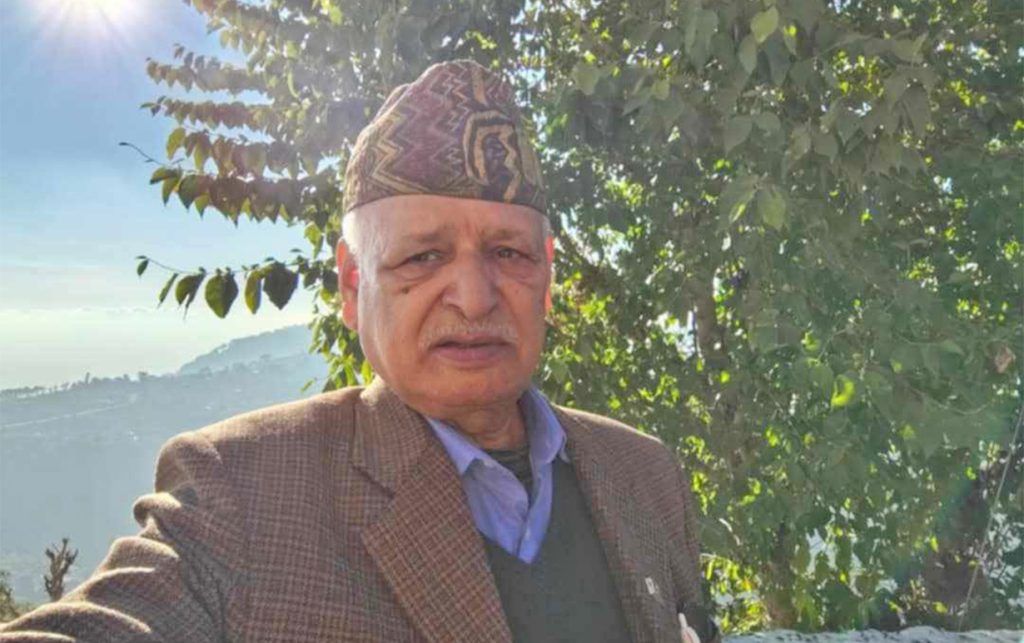
The past year has been tough for Brihaspatiya Sada Musahar who lives in the Musahar Basti in Bhangaha municipality-3. Brihaspatiya Sada lives with his wife, daughter, pregnant daughter-in-law, and two grandchildren. Whenever it rains, his roof leaks water, which has created trouble in his life.
His family is suffering due to the unfulfilled promise of the government. In 2017, the government under the Public Housing Program pledged to build a cemented house and asked the family to demolish their shack made out of straw and hay.
The government built the walls but citing a lack of budget, it did not build a roof. That meant the family had to live in a house without a roof. Life was hard but the family put a thatched roof in 2022 on their own. That did not protect them altogether from the rain or cold, but it was something. However, in April, Brihaspatiya Sada removed the thatched roof because the ward chair Jitendra Singh told him zinc plates would be provided for the roof.
Nearly six months on, their home is yet again without a roof. The ward chair did provide them with a tarpaulin which has helped them stay try but when the rain is heavy, the tarpaulin leaks leaving them wondering what they will do in winter.
Woes of living under a leaking roof

Brihaspatiya and his son Mithilesh work as labourers who are the breadwinners of the family. And for the last six months, they have been living in a makeshift house. Before, they lived in a shack they built and did not have to worry about leakages.
Modan Devi, Brihaspatiya’s wife says, “My daughter-in-law is eight months pregnant and I have two granddaughters. Due to the rain day and night, we suffered a lot. The rain even soaked our rice and clothes.”
Talking to Onlinekhabar, Modan Devi shared an experience where he had to go to a neighbour’s home for shelter with the children due to the downpour.
“The government has failed to deliver its promise. This is how it is making poor people like us suffer,” says Modan Devi.
In the Public Housing Program, residences belonging to individuals named Phul Kumari, Jaya Kumari, Kisunbatia, Samtolia, Pano, Kamodhia, and Manchit Sada, all located in the same area, remain unfinished.
In April, 10 houses received their new roofs, but there are still 15 houses without roofs. Additionally, some families have been displaced due to the destruction of their previous homes, and the condition of their new houses is deteriorating.
In April, ten houses overseen by Dev Lal Sada, who chairs the consumer committee, received roofing. However, as of now, the houses overseen by Kisunwatiya (nine in total) and those under the oversight of Jugal Sada (six in total) still lack roofs.
According to the ward chair Singh, Brihaspatiya’s house remains without a roof due to the lack of money from the Development Division Office.
“The work of building the roof could have been completed within April. But the Office of Urban Development and Building Construction, Dhanusa did not provide funding for it,” says Singh. “Site engineer Pankaj Jha went contactless. I tried a lot but the office does not care that these homes are incomplete.”
Engineer Jha, however, says that the consumer committee asked for money before starting work.
“In June money was sent to two consumer committees. They tried to take all the money before completing the work, so the work was halted. I am in contact with the ward chair,” says Jha.
The change in the management

The provincial government introduced the Public Housing program in the fiscal year 2016/17 to build homes for poor families. Later this program came under the Madhesh province government and currently, the Urban Development and Building Construction, Dhanusa, under the Ministry of Physical Infrastructure of Madhesh province is looking at this plan. Under this program, zinc roofs are to be placed on the two-room concrete houses.
According to Krishna Dev Jha, the head of the office, the beneficiaries should have an interest in building the house.
He says, “They complain that the construction of their houses remains incomplete, but they do not accept their mistake. If someone takes the lead to build the house we will pay them through cheque.”
Sanjiv Kumar Sah, mayor of Bhangaha municipality says that there would be legal complications for the local government to work on the house being built by the provincial government.
“The provincial government is very irresponsible, they neither completed the project nor handed it to us,” says Sah.
If the provincial government neglects the construction of those houses again, the local government will take the lead, he says.
This story was translated from the original Nepali version and edited for clarity and length.




















